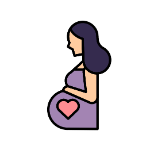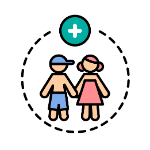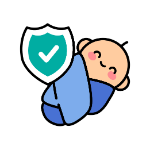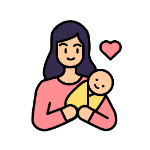
Childcare
What You Need To Know About Sudden Infant Death Syndrome (SIDS)
10 min | Updated on 30-03-2023 by HappyPreggie
(Image credits to Raising Children Network)
Definition
Sudden Infant Death Syndrome (SIDS) is the sudden death of a seemingly healthy baby under 1 year of age. The syndrome is sometimes called crib or cot death because it is commonly associated with sleep and occurs when a newborn sleeps in their crib or cot. Although there has been a thorough investigation involving an autopsy, a death scene investigation and a medical history review, the exact cause of SIDS is yet to be explained [1].
Globally, SIDS was responsible for 27 700 deaths in 2019. 2620 of these deaths occurred in babies aged 7–27 days, and 25 100 of these deaths occurred in babies aged 28–364 days [2].
The possibility of the syndrome affecting your baby can be very frightening. However, knowing more about it — and taking certain specific precautions — may help reduce your baby's risk of SIDS.
Symptoms
Unfortunately, SIDS has no symptoms or warning signs. Infants who died of SIDS have been reported to be healthy and well before being put to sleep. Although SIDS during sleep is the most common, the deaths may still occur during the day. Past research has indicated no signs of struggle or suffering, and the babies are often found in the same position as when they were placed in bed [3].
When Is The Risk Of SIDS The Highest?
(Image credits to Medical News Today)
Most SIDS deaths occur within a baby’s first 6 months of life, and the rate peaks between 1 to 4 months. The risk of SIDS reduces after they reach 8 months old, but parents are advised to maintain the safe sleep practice until the baby is at least over a year old.
Cause [4]
(Image credits to Healthline)
A combination of physical and sleep-environmental factors can make an infant more vulnerable to SIDS. However, note that these factors vary from child to child.
Physical factors
Physical factors associated with SIDS include:
- Brain defects.
- Premature or Low birth weight.
- Respiratory infection.
Sleep environmental factors
The items in a baby's crib and their sleeping position can combine with a baby's physical problems to increase the risk of SIDS. For example:
- Sleeping on the stomach or side.
- Sleeping on a soft surface.
- Co-sleeping in the same bed.
- Overheating.
Who Is At Higher Risk For SIDS?
Although SIDS can strike any newborn, several factors can increase a baby's risk, including:
- Sex - Boys are slightly more likely to die of SIDS.
- Age - Newborns are the most vulnerable between the 1st and 4th months of their life.
- Family history - Babies who've had siblings or cousins die of SIDS have a higher risk.
- Secondhand smoke - Babies who live with smokers have a higher risk of SIDS.
Maternal risk factors
During pregnancy, the mother can also increase her baby's risk of SIDS, especially if she:
- Is younger than 20
- Smokes cigarettes
- Uses drugs or alcohol
- Has inadequate prenatal care
Most health problems are diagnosed based on the symptoms they have. However, SIDS is diagnosed only after all other possible causes of death have been eliminated. This is to differentiate true SIDS deaths and those due to accidents, abuse, and previously undiagnosed illness like heart problems [5].
Ways To Reduce Risks Of SIDS [6]
(Image credits to Alaska Sleep Clinic)
#1 Put Baby To Sleep On Their Backs, And Never On Their Stomach
Your baby is at higher risk of SIDS if they sleep on their side or stomach. These positions put your baby's face facing the mattress of the sleeping surface, which can smother and block their airway. Thus, when you want to put your baby to sleep, lay them on a firm, flat surface or bed. It's also advised to not let your baby sleep in a stroller, car seat, or swings for a prolonged time.If you have anyone else taking care of your little one, tell them how important it is to lay your baby on their back each time. This is because when a baby used to sleep on their back is suddenly laid on their stomach, it increases their risks of SIDS.
You may worry about your baby choking when sleeping on their back, but healthy babies tend to swallow or cough up fluids instinctively. However, if you're still concerned, you can consult your baby's doctor about elevating your baby's head.
#2 Firm Bed, No Soft Toys or Blankets
To prevent a baby from smothering or suffocating, always lay them down to sleep on either a firm mattress or surface in a crib or bassinet. All you need in their crib is the fitted sheet, so avoid putting other stuff like blankets, pillows, and soft toys, as this can increase their risk of suffocating.#3 Don't Smoke Around Your Baby
You'll want to stop smoking before you get pregnant because babies born to women who smoke are more likely to die from SIDS. Smoking when you're pregnant is a significant risk factor, and even secondhand smoke can increase your baby's probability of death by SIDS. If anyone around you is smoking, ask them to move somewhere else.
#4 Sleep In The Same Room, Not The Same Bed
It's good to have your baby sleeping in the same room as you are, but not in the same bed, as you may end up suffocating them. Make sure you always put your sleeping baby in bed after breastfeeding or comforting them. Never bring them to bed with you when you're tired or after taking medicines that affect your sleep.#5 Breastfeed As Long As You Can
Babies who breastfeed or are fed expressed breast milk have a lower risk for SIDS compared to babies who were never fed breast milk. According to research, the longer you breastfeed your baby (without supplementing formula or solid food), the lower their risks of SIDS.#6 Consider Using a Pacifier to Put Baby to Sleep
There hasn't been a clear explanation on this matter yet, but researchers have found a correlation between putting your baby to sleep with a pacifier and lower SIDS risks. Below are some tips you can use when giving your baby a pacifier:- If you're breastfeeding, wait until your baby is regularly feeding (at least 1 month old) before giving them a pacifier. Introducing a pacifier early may cause nipple confusion and rejection.
- Don't force your baby to take the pacifier.
- Put the pacifier in your baby's mouth when you put them down to sleep, but don't put it back in their mouth after they fall asleep.
- Keep the pacifier clean, and buy a new one if the nipple is damaged.
- Don't coat the pacifier with honey, alcohol, or other substances.
#7 Keep Your Baby From Overheating
Dress your newborn in light, comfortable clothes for sleeping and maintain a comfortable room temperature that’s not too hot or cold. You can dress them in a onesie or a sleep sack if you’re worried they might be too cold, but avoid using a blanket as they may get suffocated.#8 Skip Products That Claim to Reduce the Risk of SIDS
Products that claim to reduce the SIDS risks give parents a misguided sense of security when it has not been proven safe or effective. Unless your baby has a diagnosed cardiac or respiratory illness, they do not need devices.#9 Don't Give Honey To A Newborn Under 1 Year Old
Honey can lead to botulism in young children, so never give honey to a baby. The bacteria that cause botulism may relate to SIDS.#10 Proper Prenatal Care [7]
Early and proper prenatal care teaches you how to care for your mind's and body's health, ensuring a safe pregnancy and childbirth. You'll be advised to follow a healthy diet and to avoid smoking, using drugs or drinking alcohol when pregnant. These may reduce your chance of having a premature or low birth weight baby. It also lowers the probability of SIDS as premature or low birth weight babies are at higher risk.How To Cope With SIDS [8]
(Image credits to Talkov Law)
For parents affected by SIDS, it is crucial to have access to a support network to help them cope with the aftermath. Many parents experience guilt, although it's not their fault, so a grieving period may allow them time to recover. SIDS cases also warrant a police investigation to determine the cause of death, which can further distress grieving families. Below are some ways you can do to cope with SIDS or help someone you know experiencing this issue cope:
- Support within the family
- Support from others
You can find support groups to attend in your city. If there isn't any available, you can join an online SIDS support chat room to cope with the situation.
- Counselling and psychotherapy
- The healing process
Therefore, give yourself time to accept your feelings and allow yourself to express any positive and negative emotions. Bottling up can delay your healing progress and may affect the people around you. Healing can take time, but know that every dark cloud has a silver lining.
Reference:
- https://www.childrenshospital.org/conditions/sudden-infant-death-syndrome-sids
- https://www.healthdata.org/results/gbd_summaries/2019/sudden-infant-death-syndrome-level-3-cause
- https://rarediseases.org/rare-diseases/sudden-infant-death-syndrome/
- https://www.mayoclinic.org/diseases-conditions/sudden-infant-death-syndrome/symptoms-causes/syc-20352800
- https://kidshealth.org/en/parents/sids.html
- https://www.webmd.com/parenting/sids-prevention
- https://www.urmc.rochester.edu/encyclopedia/content.aspx?contenttypeid=90&contentid=p02412
- https://www.news-medical.net/health/Coping-with-Sudden-Infant-Death-Syndrome-(SIDS).aspx
Join the largest support network for family health and well-being. Ready to get started?
Get started
















